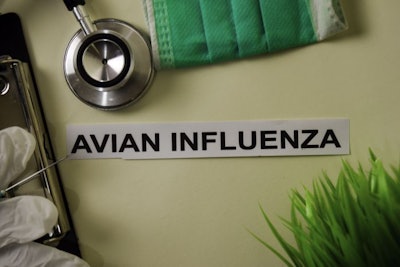
As the number of outbreaks of highly pathogenic avian influenza (HPAI) among poultry in France approaches 450, the virus has also been detected on large commercial farms in Germany, Poland, Russia, and Sweden
The first cases for the season have been detected on farms in Bulgaria and Italy, while 15 European countries have officially registered the infection in wild birds. Meanwhile, in Germany, one unusual virus variant has been detected in a wild bird for the first time.
Impact in France
France’s total HPAI outbreaks now stands at a total of 447, according to the latest update from the agriculture ministry. Of this total, 434 outbreaks are confirmed in the south-west of the country — mainly in domestic flocks of ducks or mixed waterfowl. HPAI has been detected among a 13 poultry flocks in other regions of France, as well as in wild birds at 11 locations.
Based on official reports to the World Organisation for Animal Health (OIE), there were 422 HPAI outbreaks among French domestic poultry flocks up to the end of January (from November last year).
Over the past week, the French authorities have registered outbreaks at 114 locations, and directly involving 576,755 birds. Broadly, these cases were discovered after testing positive for the H5N8 virus variant during the month of January. One of the recent outbreaks was the first in Ardennes, a northeastern department that borders Belgium. Accounting for 335 of the total outbreaks, the worst-affected department so far has been Landes in the southwest of France.
Following the current trends, the majority of the confirmed outbreaks in January affected flocks of ducks in the south-west of France kept for slaughter or liver production. Subject to surveillance testing before movements, these flocks generally range in size from a few hundred birds to many thousands. In addition, the virus has also been detected at farms raising chickens, guinea fowl, quails, and one with geese commercially, as well as a handful of backyard flocks.
As part of the HPAI surveillance of duck and goose flocks in the region, a low-pathogenic avian influenza (LPAI) virus has now been detected at five farms in south-west France since the start of this year.
HPAI detected at another Russian poultry farm
After mortalities approached 100,000 birds at a turkey farm in Rostov oblast at the end of January, the H5N8 HPAI virus was detected. According to the agriculture ministry’s latest report to the OIE, the remaining 114,000 birds were scheduled for culling.
Bringing the outbreak total to eight, these latest cases raise the number of poultry directly impacted by the disease to more than 2.67 million. The location of now four of the outbreaks, Rostov oblast belongs to Russia’s Southern federal district. First outbreak back in September of 2020 was in the North Caucasus district, and the virus has also been detected at a farm in the Volga district.
Germany registers first HPAI outbreak in poultry in Bavaria
In the southeastern state of Bavaria, the H5N8 HPAI virus has recently been detected for the first time in poultry since May of 2020. Affected was a small backyard flock.
Over the past week, the agriculture ministry has also registered with the OIE two additional outbreaks of HPAI linked to the same virus variant in Mecklenburg-West Pomerania, and one in Brandenburg. All three flocks comprised fattening turkeys.
Latest update from the national veterinary reference laboratory, Friedrich-Loeffler Institute puts the total number of HPAI-positive tests in German birds (wild species and poultry) at 2,794. This is an increase of 48 cases since January 21, and it includes a first positive test for a wild bird in Berlin.
HPAI returns to Bulgaria and Italy
After an absence of seven months, HPAI has been detected in a poultry flock in Bulgaria, according to the national food safety authority. The H5N8 virus was detected at a farm in Slavyanovo in the northern province of Pleven. Elevated mortality was observed in the flock of around 99,000 poultry. Remaining birds are scheduled for culling and disposal.
The H5N8 HPAI virus has been detected in Italy for the first time since March of 2018. According to the official report to the OIE, two cranes that died tested positive for the virus at the end of January. Also part of the non-commercial flock were 11 chickens, which were separately housed and all subsequently tested negative. Located in Ravenna province in Emilia-Romagna, the premises is close to a river frequented by wild birds. Subsequent investigation revealed the isolated virus is very similar genetically to the type found in wild birds across Europe this winter. These developments point to wild species being the source of infection on the captive cranes.
Further outbreaks among poultry flocks in Belgium, Poland, Sweden, U.K.
Six further HPAI outbreaks linked to the H5N8 virus variant have been confirmed by Poland’s chief veterinary office over the past week. They bring the country’s total so far this year to 16.
Latest to be affected are five commercial poultry flocks, including three with fattening turkeys, one with breeding hens, and one mixed flock of roosters and ducks. Including a small backyard laying flock, these outbreaks directly involved almost 186,000 poultry.
In Belgium, a second outbreak linked to the H5N5 virus has been registered with the OIE. A flock of more than 27,000 turkeys tested positive for the virus at the end of last month after around 1,000 of the birds died. Like the only previous outbreak in the country in November of last year, the affected premises was in West Flanders province.
A second egg-laying flock has tested positive for HPAI in Kalmar county, reports the Swedish Board of Agriculture. A previous outbreak linked to the H5N5 virus was reported in the same district (Monsteras) of this southern county in mid-January, the affected farm is located. The latest outbreak brings Sweden’s total since November of 2020 to six.
Latest premises to be confirmed with HPAI in the United Kingdom (U.K.) is a farm rearing game birds on the island of Anglesey off the coast of Wales. According to the official report to the OIE, around 600 out of 1,500 pheasants died, along with one other bird (species unspecified) during the third week of January.
Wild birds: 15 European countries detect new cases, virus variants
Over the past week, veterinary authorities of Austria, France, and Germany have reported to the OIE the first detections of HPAI viruses in new areas.
For Austria, discovery of the H5N8 HPAI virus in a wild swan found dead in Lower Austria represents the first detection of an HPAI virus in the country since April of 2017. Located in the northeast of the country, the region of Lower Austria borders both the Czech Republic and Slovakia, which have confirmed the presence of this virus variant in their respective territories.
In France, the recent detection of the H5N3 HPAI virus in wild birds is the first time this virus variant has occurred in the country. A large number of wild birds tested positive in the northern department of Manche. Latest update from the French agriculture ministry puts the number of HPAI outbreaks in wild birds across the country at 11.
Germany’s agriculture ministry has registered 11 separate reports with the OIE regarding new detections of HPAI in wild birds in the last week. A significant development is the country’s first ever detection of an H5N4 variant — in a dead swan in the southwestern state of Baden-Wurttemberg.
After a short absence, the H5N3 variant has returned to Lower Saxony, and the H5N5 virus subtype has reemerged in Bavaria and Baden-Wurttemberg. Linked to the H5N8 or H5N5 virus families, there have also been additional cases in wild birds in Bavaria, Brandenburg, Hamburg, Mecklenburg-West Pomerania, Lower Saxony, and Schleswig-Holstein.
Other countries registering further wild bird outbreaks in previous outbreak threads over the past week were Belgium, Czech Republic, Finland, Irish Republic, Italy, Hungary, Norway, Poland, Romania, Russia, Slovakia, and the U.K.
View our continuing coverage of the global avian influenza situation.















